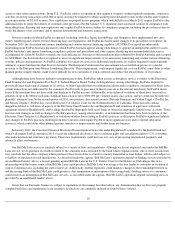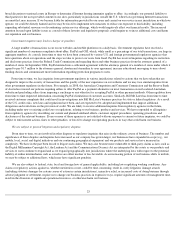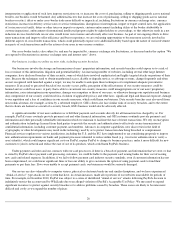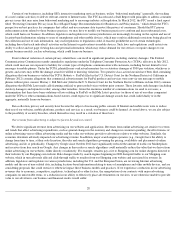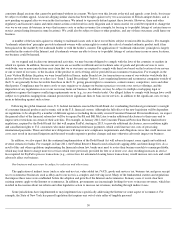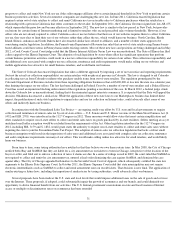eBay 2012 Annual Report Download - page 25
Download and view the complete annual report
Please find page 25 of the 2012 eBay annual report below. You can navigate through the pages in the report by either clicking on the pages listed below, or by using the keyword search tool below to find specific information within the annual report.
broad discretion to national courts in Europe to determine if Internet hosting immunity applies to eBay. Accordingly, our potential liability to
third parties for the user-provided content on our sites, particularly in jurisdictions outside the U.S. where laws governing Internet transactions
are unsettled, may increase. If we become liable for information provided by our users and carried on our service in any jurisdiction in which we
operate, we could be directly harmed and we may be forced to implement new measures to reduce our exposure to this liability, including
expending substantial resources or discontinuing certain service offerings, which would negatively affect our financial results. The increased
attention focused upon liability issues as a result of these lawsuits and legislative proposals could require us to incur additional costs and harm
our reputation and our business.
Government inquiries may lead to charges or penalties.
A large number of transactions occur on our websites and mobile platforms on a daily basis. Government regulators have received a
significant number of consumer complaints about eBay, PayPal and GSI, which, while small as a percentage of our total transactions, are large in
aggregate numbers. As a result, from time to time we have been contacted by various U.S. and foreign governmental regulatory agencies that
have questions about our operations and the steps we take to protect our users from fraud. PayPal has received inquiries regarding its restriction
and disclosure practices from the Federal Trade Commission and regarding these and other business practices from the attorneys general of a
number of states. In September 2006, PayPal entered into a settlement agreement with the attorneys general of a number of states under which it
agreed to pay $1.7 million to the attorneys general, shorten and streamline its user agreement, increase educational messaging to users about
funding choices and communicate more information regarding protection programs to users.
From time to time, we face inquiries from government regulators in various jurisdictions related to actions that we have taken that are
designed to improve the security of transactions and the quality of the user experience on our websites and we may face similar inquiries from
other government regulators in the future. For example, in 2008, the Australian Competition and Consumer Commission and the Reserve Bank
of Australia reviewed our policies requiring sellers to offer PayPal as a payment alternative on most transactions on our localized Australian
website and precluding sellers from imposing a surcharge or any other fee for accepting PayPal or other payment methods. Other regulators have
from time to time requested information concerning PayPal's limitations of customer accounts. Similarly, Bill Me Later has from time to time
received customer complaints that could result in investigations into Bill Me Later's business practices by state or federal regulators. As a result
of the U.S. credit crisis, new laws and regulations have been, and are expected to be, adopted and implemented that impose additional
obligations and restrictions on the provision of credit. We are likely to receive additional inquiries from regulatory agencies in the future,
including under new or existing credit laws or regulations, relating to our business, products and services. We have responded to all inquiries
from regulatory agencies by describing our current and planned antifraud efforts, customer support procedures, operating procedures and
disclosures of the relevant business. If one or more of these agencies is not satisfied with our response to current or future inquiries, we could be
subject to enforcement actions, fines or other penalties, or forced to change our operating practices in ways that could harm our business.
We are subject to general litigation and regulatory disputes.
From time to time, we are involved in other disputes or regulatory inquiries that arise in the ordinary course of business. The number and
significance of these disputes and inquiries have increased as our company has grown larger, our businesses have expanded in scope (e.g., our
mobile, local, social and digital initiatives and our continuing geographical expansion) and our products and services have increased in
complexity. We have in the past been forced to litigate such claims. We may also become more vulnerable to third-party claims as laws such as
the Digital Millennium Copyright Act, the Lanham Act and the Communications Decency Act are interpreted by the courts as our products and
services to users continue to expand and as we expand geographically into jurisdictions where the underlying laws with respect to the potential
liability of online intermediaries such as ourselves are either unclear or less favorable. As an increasing portion of our business shifts to mobile,
we may be subject to additional laws, which may have significant penalties.
We are also subject to federal, state, local and foreign laws of general applicability, including laws regulating working conditions. Any
claims or regulatory actions against us, whether meritorious or not, could be time consuming, result in costly litigation, damage awards
(including statutory damages for certain causes of action in certain jurisdictions), injunctive relief, or increased costs of doing business through
adverse judgment or settlement, require us to change our business practices in expensive ways, require significant amounts of management time,
result in the diversion of significant operational resources, or otherwise harm our business.
23







